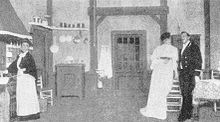Miss Julie
| Miss Julie | |
|---|---|

The first production in Stockholm of Miss Julie in November 1906, at The People's Theatre. Sacha Sjöström (left) as Kristin, Manda Björling as Miss Julie, and August Falck as Jean.
|
|
| Written by | August Strindberg |
| Characters | Miss Julie, Jean, Christine |
| Date premiered | March 14, 1889 |
| Original language | Swedish |
| Genre | Naturalism |
Miss Julie (Swedish: Fröken Julie) is a naturalistic play written in 1888 by August Strindberg. It is set on Midsummer's Eve on the estate of a Count in Sweden. The young woman of the title is drawn to a senior servant, a valet named Jean, who is particularly well-traveled, well-mannered and well-read. The action takes place in the kitchen of Miss Julie's father's manor, where Jean's fiancée, a servant named Christine, cooks and sometimes sleeps while Jean and Miss Julie talk.
On this night the relationship between Miss Julie and Jean escalates rapidly to feelings of love and is subsequently consummated. Over the course of the play Miss Julie and Jean battle until Jean convinces her that the only way to escape her predicament is to commit suicide.
One theme of the play is Darwinism, a theory that was a significant influence on the author during his naturalistic period. This is stated explicitly in the preface, where Strindberg describes his two lead characters, Miss Julie and Jean, as vying against each other in an evolutionary “life and death” battle for a survival of the fittest. The character, Miss Julie, represents the last of an old aristocratic breed about to die out as well as a characterization of women in modernity, whereas Jean represents one who is clambering upwards, and who is more fit to thrive because he is better able to adapt in terms of the “life roles” he can take on. The play contains a variety of themes, partly because Miss Julie’s actions are motivated by a range of factors and influences: Her class, her desires and impulsive nature, her father, and the dynamic traumas of her family histories. She is given a number of motivations because the author, in wanting to be naturalistic, realizes that in life people can be motivated in a number of ways, and also because the author is taking a stand against the dominant theatrical idea that says that characters should be written with only one primary motivation.
The play is preceded by a remarkable author’s preface, which concerns itself with Strindberg’s ideas of naturalism and how they apply to his play, Miss Julie. With the preface Strindberg talks about ideas of the aristocracy and classism arguably even more so than the play itself. In the preface he describes both Jean and Julie as stereotypical representation of their class and society. Miss Julie is especially condemned by Strindberg "as a modern character which does not mean that the man-hating half-woman has not existed in every age... woman, this stunted form of human being who stands between man, the lord of creation, the creator of culture, [and the child], is meant to be the equal of man or could ever be, she involves herself in an absurd struggle in which she falls." Strindberg, with his description of Miss Julie is his preface sets her up as a character representing women in the age of modernity, stating in the preface their downfall through the medium of his naturalistic tragedies.
...
Wikipedia
